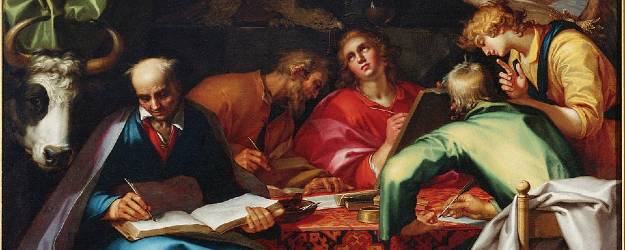Why Does Jesus Have Two Genealogies?
Question One: Dear Father, I am in a Bible study in my parish and I was wondering, as we are about to begin reading the New Testament, I am wondering why are there two different genealogies for Jesus in the New Testament?
Answer: Thanks for this great question! The two genealogies of Jesus in the New Testament, found in Matthew 1:1–17 and Luke 3:23–38, differ because they serve distinct theological and historical purposes, reflecting the unique audiences and emphases of the two Gospels.
Matthew’s Genealogy (Matthew 1:1–17) was written primarily for a Jewish audience. Matthew emphasizes Jesus’ identity as the Messianic King from the line of David and Abraham. It traces Jesus’ lineage through Joseph, His legal father, highlighting Jesus’ legal claim to the throne of David.
Matthew structures the genealogy in three sets of fourteen generations (Abraham to David, David to the exile, and the exile to Jesus), which underscores divine providence and fulfillment of prophecy (e.g., 2 Samuel 7:12–16).
On the other hand, Luke’s Genealogy (Luke 3:23–38) was written for a Gentile audience. Luke emphasizes Jesus’ universal mission and solidarity with all humanity. It traces Jesus’ lineage all the way back to Adam, emphasizing Jesus as the “new Adam” and the Savior of all people (cf. Romans 5:12–21; 1 Corinthians 15:45). Luke’s genealogy appears to follow the biological line through Mary, focusing on Jesus’ true humanity and divine origin.
Matthew traces the legal lineage through Joseph, who was Jesus’ adoptive father. By Jewish law, adoptive fathers conveyed legal rights, including inheritance. Luke likely traces the biological lineage through Mary, as suggested by the phrase “being the son (as was supposed) of Joseph” (Luke 3:23), implying an alternative lineage. Matthew traces Jesus’ descent from David through Solomon, the royal line. Luke traces Jesus’ descent from David through Nathan, a lesser-known son of David, which could reflect Mary’s lineage.
Both genealogies emphasize different theological truths: Matthew connects Jesus to Jewish history and prophecy and Luke underscores Jesus’ humanity and universal mission. Both genealogies affirm Jesus as the Messiah, fulfilling Old Testament prophecies about the son of David and the seed of Abraham (e.g., Genesis 12:3; 2 Samuel 7:12–13). Luke’s genealogy emphasizes Jesus’ connection to all humanity, not just the Jewish people. Together, the genealogies affirm both Jesus’ legal claim to the Davidic throne and His biological connection to humanity. While the genealogies differ in details, they are complementary rather than contradictory. They highlight Jesus’ dual nature as both Son of God and Son of Man, fulfilling God’s promises to Israel while extending salvation to all people.
Did Islam Come from Christian Heresies?
Question Two: I recently heard a commentator state that Islam grew out of Christian Christological heresies. Is this the case?
Answer: The question of whether Islam “grew out of” Christian Christological heresies is complex and requires examining the historical, theological, and cultural contexts in which Islam emerged. While Islam is distinct from Christianity, certain aspects of early Islamic theology appear to engage with debates that were prominent among Christians in the late antique period. Islam arose in the seventh century in the Arabian Peninsula, a region where various religious traditions, including Judaism, Christianity, and Arabian polytheism, were present. Among the Christian groups, there were numerous theological disputes, particularly concerning the nature of Christ.
Islam’s understanding of Jesus (known as ʿĪsā) shares certain elements with Christian Christological heresies. Islam regards Jesus as a prophet and messenger of God, not as God or the Son of God. This resembles Arianism, a fourth-century heresy that denied Christ’s divinity. Islam teaches that Jesus was not crucified but was taken up to heaven, with someone else appearing to die in His place (Qur’an 4:157–158). This could echo Docetism, which claimed that Christ’s physical suffering and death were only apparent. The Qur’an rejects the Trinity (e.g., Qur’an 4:171, 5:73), and its characterization of the Trinity suggests misunderstanding or oversimplification. Some scholars argue this critique aligns with certain misunderstandings of the Trinity prevalent among groups like the Monophysites or Nestorians, which emphasized different aspects of Christ’s nature.
Islam did not simply “grow out of” Christian heresies, but it seems to have been influenced by Christian debates. Some examples are:
- Arianism:
Arianism’s denial of Christ’s divinity aligns with Islam’s insistence on strict monotheism (tawhid). Arians were still active in the Arabian region during the time of Muhammad. - Nestorianism:
Nestorians, who emphasized the distinction between Christ’s divine and human natures, were prominent in the Persian Empire and may have influenced Muhammad’s understanding of Christianity. - Ebionitism:
The Ebionites, an early Jewish-Christian sect, viewed Jesus as a human prophet rather than divine, which is similar to Islam’s portrayal of Jesus.
While Islam engages with themes found in Christian Christological heresies, it is not merely an extension of these heresies. Key distinctions include the fact that Islam introduces a new prophet, Muhammad, and the Qur’an as a new revelation. Islamic theology is rooted in a distinct Arabian religious and cultural context, incorporating elements of Jewish and pagan traditions, and unlike heretical Christian movements, Islam forms an entirely separate religious system with its own sacred text, rituals, and law.
This question is important for understanding both Interfaith Dialogue (recognizing how early Islam engaged with Christian theology can foster deeper discussions between Christians and Muslims) as well as Christology (the comparison highlights how central debates over Christ’s identity have shaped different religious traditions). It underscores the diverse religious environment of late antiquity, where theological debates influenced emerging faiths.
Islam is not a “Christian heresy” in a strict sense but arose in a context influenced by Jewish, Christian, and Arabian religious thought. Its Christology and theology engage with Christian ideas, sometimes reflecting the perspectives of groups considered heretical by the orthodox Christian Church. Understanding these connections can deepen our comprehension of both Islam and the theological debates of late antiquity.

Recent Comments